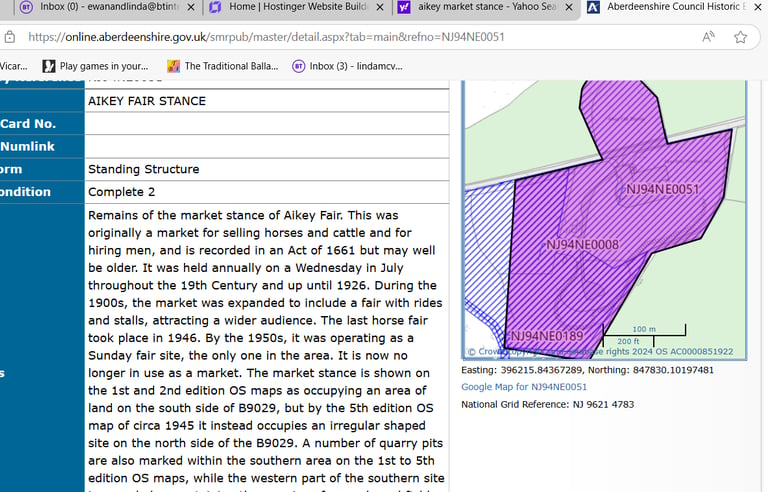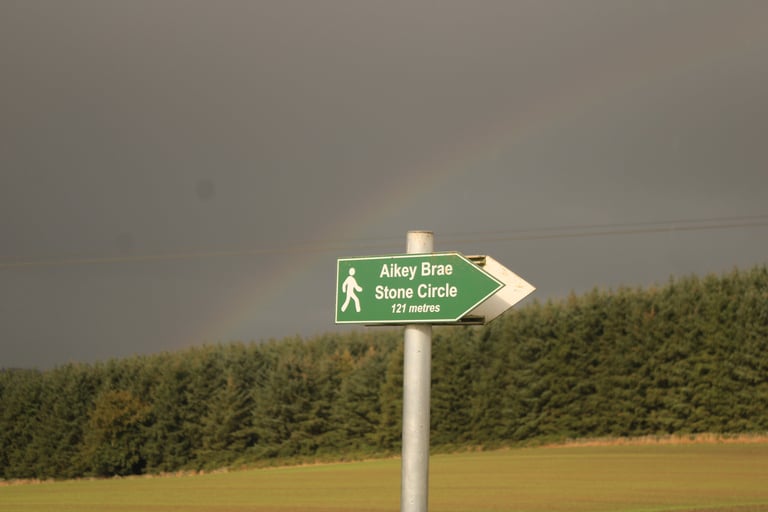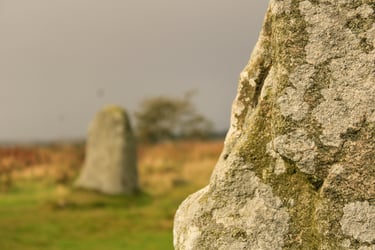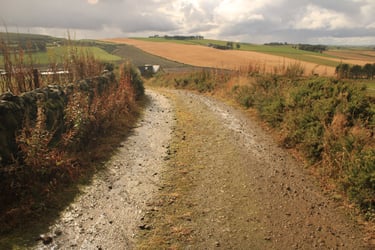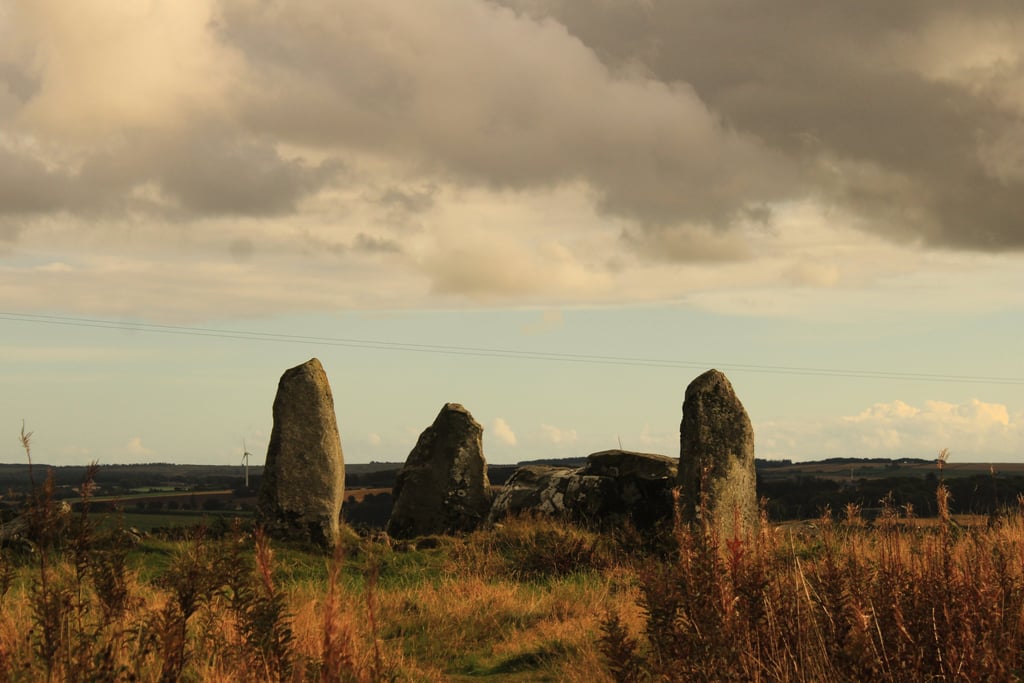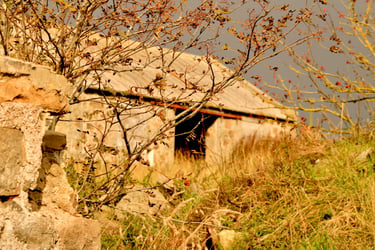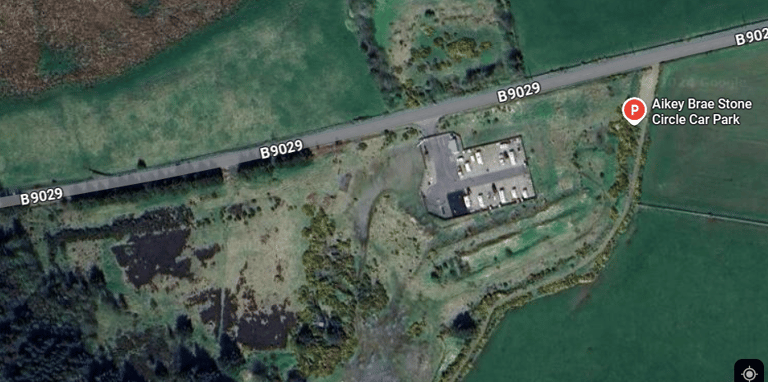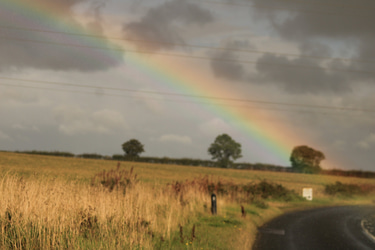Aikey Fair, 15 October 1952 Sung by Jimmy MacBeath
Tam's friends ask him to go to Aikey Fair and he tells them he is going to sell the clip [colt] and the grey mare on Wednesday.
Aikey Brae, c. February 1960 Sung by Andrew Robbie
The singer is persuaded by his friends to visit the Sunday Fair at Aikey Brae and gets himself washed, shaved and dressed. He is shocked by what he sees of the crowds and entertainment.
Opinion of Aikey Fair., 16 July 1960
The contributor has been coming to Aikey Fair for the last three years [in 1960]. It was "bloody awful". In bad weather it was hopeless.
Calls of showpeople at Aikey Fair., 16 July 1960
Showpeople's calls are heard. A showman calls, "One over the top, any one you like." The interviewer says "ring game", and "the hoop game". A showman tells hi...
Aikey Fair was started by a packman, April 1975 Told by Lucy Stewart
The origin of Aikey Fair; the decline of fairs and markets.Aikey Fair was started by a packman. He fell in the river while crossing by stepping stones and got all the drapery in his pack wet.
The sounds of Aikey Fair, including some sellers 16 July 1960
The sounds of Aikey Fair, including some sellers trying to attract customers, especially a man selling watches.
Sellers at Aikey Fair, including one selling crockery 16 July 1960
Sellers at Aikey Fair, including one selling crockery and one selling bedding, try to interest customers.
Aikey Fair originated in a packman drying his wares , 18 October 1972
Aikey Fair originated in a packman drying his wares on the broom bushes.
A packman who was selling drapery round the doors was crossing a river using stepping stones. He slipped and fell in, pa...
Biographical information from GEORGE VITCH, 16TH July 1960
He has been coming to Aikey Fair for sixty years. He was born in Montauban, France. Both his parents were French. He lived in Scotland.
Biographical information about George Vitch, partly in FrencH.., 15 July 1960
More biographical information about George Vitch, partly in French.
A crockery seller from Manchester finds he is accepted in Fi..., 16 July 1960
Mr Morgan, a crockery seller from Manchester finds he is accepted in Fife, and that Scots are receptive to humorous sales patter.
RECORDINGS FROM / ABOUT AIKEY FAIR IN TOBAR AN DUALCHAIS
ABOUT AIKEY FAIR
Aikey Fair was held annually on Aikey Brae, in the parish of Old Deer, in Buchan, the largest fair in the North of Scotland. A legendary account of its origin is to the effect that a paekman of unknown antiquity, Aul’ Aikey by name, in crossing the river Ugie, on stepping stones, a mile west of the ancient "Abbey of Deir," dropped his pack. On fishing it out of the water, then slightly flooded, he proceeded some three hundred yards farther on to what is now known as Aikey Brae, which was then, as it still is, covered with short grass and heath. Here he spread out his goods to dry. The contents of the pack consisted of prints and woollens, some of them being of gaudy colours. A good many people passed during the day, and being attracted by his stock bought up all the articles in it. Aul’ Aikey was charmed with the success which followed what he had regarded as a calamity—the accidental soaking of his pack. Apologising to his purchasers for the meagerness of his stock he promised to show them something better worth looking at if they would meet him next year at the same time and place. He kept his word, while the report of his gains brought others with goods for sale to the same place, and so traffic gradually increased year by year till Aikey Brae, from its central position, became a general mart for the large and populous district of Buchan.
Doubtless the story of the packman is fully as picturesque as credible. But be that as it may, the hillside called Aikey Brae, where Aikey Fair was held yearly on the Wednesday after the 19th of July, slopes to the north down to the Ugie, while between the market stance and the river runs eastward from New Maud Junction, the Peterhead branch of the Buchan and Formartine Railway. The Brae affords an extensive view of the country to the west, north, and east, including the fine grounds of Pitfour, with the mouldering ruins of the Abbey of Deer nestling amid the orchard gardens of the same seat, the grounds of Aden, and half-a-dozen miles to the north, the highest ground in Buchan —Mormond Hill — with the noted figure of a white horse occupying an acre of the surface of the south slope of the hill, the space within the outline of the animal being covered with white quartzose stones.
When their great annual fair approached the dwellers in Buchan, eastward and westward, began to bestir themselves in preparation for the most important gathering of the year. On the day preceding the fair cattle were to be seen converging from all sides to fields within easy reach of the stance. Dealers and others from a distance came, all on horseback. Thus at the ford of the Ebrie, near Arnage, some eight miles off, as many as a hundred horsemen would pass on the evening before the fair. They rode not unfrequently at full gallop. Bets on the comparative merits of their horses sometimes gave rise to racing, but there was, in addition, the prevalent notion that it involved a sort of slur to allow your neighbour to pass you on the road to the fair. On the day of the fair fifty or sixty acres of Aikey Brae were covered with human beings, cattle, horses, and various kinds of merchandise.
Aikey Fair day was regarded as the great summer holiday; and both old and young flocked to it. Indeed, it was the boast to have seen so many fairs. "Old Cairnadaillie," who died at the age of ninety six, affirmed that he had been at ninety-one successive fairs at Aikey Brae, having been first carried there in his mother’s arms. As many as 10,000 persons are said to have been sometimes present, all attired in their Sunday best.
The men appeared in the old-fashioned, home-spun, woven, and tailored coat and vest, with big pockets and big buttons, knee breeches and hose, all made of the wool of sheep reared at home. They wore shoes with large buckles; and some of the rustic dandies came dressed in white trousers and vest. The women also were in their "‘braws," and those of the fair sex who could afford it appeared in white. They generally wore high-crowned gipsy mutches.
Then, as now, in matters of dress, the common folk trod on the heels of the gentry. The latter made a point of attending the fair, and several carriages might always be seen at it. The traffic at Aikey Fair, as at other annual fairs of the period, included cattle, horses, sheep, merchandise, and chap-book literature of no very pretentious character. There was always a wonderful supply of "carvy" and, coriander sweeties wherewith the lads might treat the lasses. The shows and amusements at the fair were of a very simple kind. The pipers from the country around assembled, and often a dance would be improvised on the green-sward. As time wore on there appeared the " slicht o han’ men" to divide the attention of the idle and curious.
Cattle and horses chiefly were the animals exposed for sale at the fair, very few sheep being reared in the districts around it. Most of the cattle sold in the fair were driven south by Savock of Deer, Tarves, Inverurie, Echt, Banchory, the Cairn o’ Month, &c., to be fattened on the rich pastures of England. As many as 6000 beasts are said to have passed through Tarves in a continuous drove, a mile long, on their way south on the day after the fair. In 1836, however, only 2200 cattle were counted.
The merchandise sold in Aikey Fair about 1800 consisted chiefly of webs of sacking, bed-tick, a variety of prints often of gaudy colours, cottons in the shape of moleskins and corduroys, of which the outer garments of working men were then mostly made; wool and yarn were also sold in large quantities.
On the day before the fair there used to be a large wholesale business done in woollen cloths among merchants and others. About the period indicated there were, as now, tents in the fair for supplying refreshments. Such a thing as whisky for sale was unknown, the liquor being confined to home-brewed ale, which was much drunk, though it was rare to see any one tipsy.
Jean Stewart's band regularly played at the Aikey Fair, held the Sunday nearest the 19th July each year.
'The dancin started on Friday nicht in the marquee an ran ran through the weekend. [Elizabeth's] mither an her bad wid be booked tae play Friday, Saturday and Sunday. Her band wis the best an they were local too, That was a regular booking for many years. ' Elizabeth Stewart
